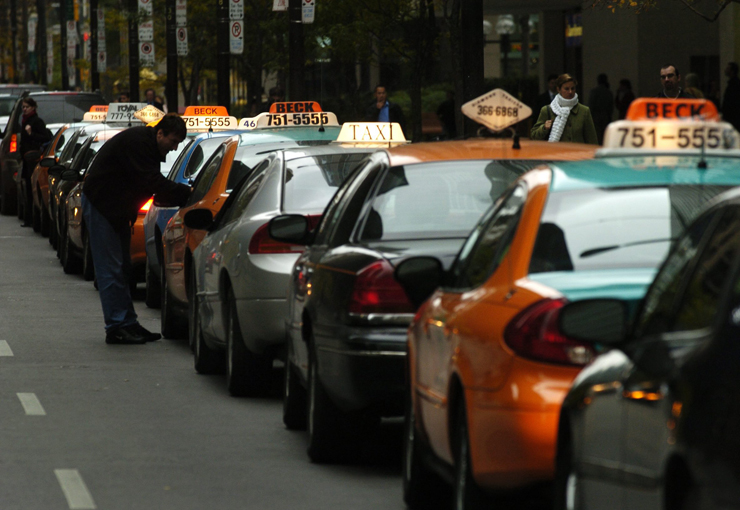In the space of two years, Toronto’s taxi licences plunged in price from a high of $360,000 in mid-2012 to below $100,000 in mid-2014.

What happened?
New municipal rules, for one.
And Uber.
The taxi app, whose business practices are either disruptive or illegal, depending whom you ask, has proven wildly popular among some consumers and caused consternation among taxi drivers and local governments, many of which – Toronto included – have tried to kick them out.
Chris Livisianos just sold a taxi licence for his father on Kijiji. He got $200,000 for it – bought in the 1980s for about $100,000, he broke even, adjusting for inflation.
It was the last of three licences he owned – each sold for less than the previous one.
“It kind of sucks that it dropped so much,” Livisianos said. “He sold his first one for $295,000, he sold his second one for $225,000, now the last one for $200,000.”
His father has been in the taxi business for close to four decades, Livisianos said. “He bought three plates, and he’s just been renting them out to drivers for that long.”
Until recently, that was the norm.
But last February, Toronto councillors decided to phase out traditional taxi plates by 2024. Owners of the new plates, unlike the current standard plate, must drive the cab for at least 167 hours a month. Standard plate owners, on the other hand, can rent their plates out to drivers.
The change pleases Sajid Mughal, who heads the iTaxiworkers Association – the closest thing drivers have to a union.
“The industry was held hostage to investors who had no direct interaction with the public, but just took money out of the system,“ he said.
“This is not the stock market. It’s a hard job. Drivers are working twelve hours a day, seven days a week, and they still don’t make enough money. ”
But it undercuts the value of standard licences that were a significant investment for their owners, says Kristine Hubbard, operations manager at Beck Taxi.
“They didn’t have an alternative. The city said that owning and operating a taxi can be a profitable business, and this is what they were lured in by. Now we have this future of no value, no opportunity, no ability to run a business and stay in business – who is the next generation cab driver?”
For plate owners, leasing plates to drivers was often the basis of a retirement plan, Hubbard says.
“That gives them the opportunity to maybe stop driving twelve hours a day for seven days a week, and hire someone to generate some income. As long as they’re doing a good job managing their business, why are they not allowed to retire?”
Plate values started to fall after August 2012, when Uber entered the Toronto taxi market. Their value never recovered.
In 2014, licences sold for an average of $118,235, down from $153,867 in 2013 and $227,976 in 2012.
“You’ve got bandit cabs that are flooding the city, out in the open, which is like deregulation, so why would someone pay for a licence when they don’t really need one?” Hubbard asks. “People don’t know if they’ll be rendered worthless.”
The market peaked with Standard licence #1859. It sold on September 10, 2012 for $360,000, just a few weeks after Uber entered the Toronto taxi market, followed by rival Hailo (which has since left of its own accord). Licence prices have never recovered.
Last fall Toronto announced it would ask for a court order to shut Uber down as an unlicenced taxi company. Uber argues it’s a technology company, not a taxi company, and therefore not subject to the rules.
The lawsuit followed a city probe in which regulators hired private investigators to probe Uber’s Toronto operations. The case will be heard in May.
However, after the city asked for the injunction, newly elected mayor John Tory said that Uber and companies like it were “here to stay,” and that “it is time our regulatory system got in line with evolving consumer demands.”
“I would consider them kind of the organized crime element of the age-old bandit cab problem,” Hubbard says of Uber. “My father drove a taxi, both my grandfathers drove taxis – bandit cabs are not new, but this is the new way of somehow trying to make them seem legitimate when they’re not.”
(Uber declined to speak with Global News on the record for this story. It has brushed off similar critiques in the past as coming from people resistant to innovation and consumer choice, arguing the taxi system is “broken.”)
Mughal sees UberX, a low-cost version of Uber that uses drivers without taxi licences, as the real problem.
“It’s a cancer, and spreading very fast. I’m surprised that the city is taking so long to take any action about UberX. Uber is not as harmful as UberX,” he said.
“UberX is just killing the cab industry. Drivers did not feel much impact when Uber was working, but UberX, with only a few weeks in the market, drivers are feeling the impact.”
Mughal also suspects licence costs will continue to plummet.
“Let’s say a plate is worth about $150,000. If the city does not stop UberX, in about a year’s time the value of this plate will be zero.”
Global News obtained taxi licence price data from the City of Toronto under an access-to-information request.
City data shows that the taxi plate lease business is holding its value, at least for now:




Comments